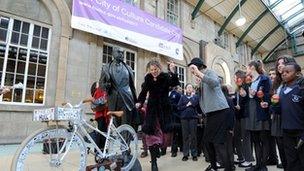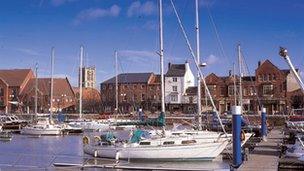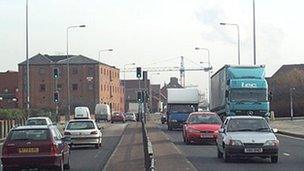How Hull hopes to benefit from the City of Culture title
- Published

The council claims winning the City of Culture title would be worth £60m to Hull
After the euphoria following the announcement that Hull had been awarded the title of UK City of Culture in 2017 the focus has now turned to how the city will cope with the anticipated influx of visitors.
Hull City Council is hoping the event will raise the profile of the area and bring an economic boost.
Councillor Steven Bayes, who was part of the successful bid team, said winning the title could bring an additional £60m of spending and create 7,500 new jobs, but no exact details have been given to provide substance to the numbers.
Even so, tourist chiefs are already confident the final figure will exceed current projections.
The projected cost to the city will be £15m, paid for from a combination of public money and investment from the private sector.
The council has committed £3.5m with an expected Arts Council grant of £3m and the possibility of Lottery and other grant funding.
Revenue predictions are based on the experience of other UK cities that have hosted large cultural events, with the council is working on a formulae that claims every £1 invested is expected to generate £5.
'Nothing started'
One potential problem facing the city is a lack of hotel rooms.
Figures from the Department of Culture Media and Sport show the current City of Culture host, Derry-Londonderry, saw a doubling of visitors to the city with an estimated extra 600,000 tourists over the course of the year.

The number of hotel rooms will have to increase to meet the predicted demand
Hull currently has 2,116 hotel beds, with the bid document estimating an additional 1,234 spaces would be needed for 2017.
Two major hotel developments in the city centre have been approved, but no building work has started.
Sarah Whitfield, vice chair of the Hull and East Yorkshire Hospitality Association, said the last few years had been "difficult" for hoteliers but the 2017 event should see new hotels finally being built.
"There has been a lot of plans but nothing has actually started Hull," she said.
"I think this could be a real opportunity and the real kick-start for tourism and further hotels in the future."
End of the line
The isolated location of the city is another consideration. It has been described by local Labour MP Diana Johnson as being "tucked away".
"You don't go through Hull to get anywhere else." she said.
Sitting on the banks of the Humber estuary, the city has one main rail line in and out and is at the end of the M62 motorway.
A £160m scheme to upgrade the main A63 Castle Street, which runs through the heart of the city, has been announced by the government, but work will not start until 2015 at the earliest.
Dave Hatfield, manger for First TransPennine Express at Hull's Paragon Station, said that local train operators were considering promoting the City of Culture event by the use of specially painted trains and changing the station's platform signs.
"We'd be looking certainly to market Hull a lot better than it has been," said Mr Hatfield.
"With that we can possibly look at extra services coming across the Pennines from Liverpool and Manchester."
"Equally, Hull Trains may well be looking at additional services as well."

Work on the A63 Castle Street will not start until after the 2015 General Election
Gary Verity, chief executive of tourist authority Welcome to Yorkshire said he had no doubts about the city's ability to deliver a "world class" event in 2017.
He described the announcement as "a significant point in the history of Hull".
"This will be a catalyst for Hull moving forward in a massively positive fashion," he said.
"The estimate for Hull is that this will be worth £60m to the economy.
"I would suspect that by the time we get round to 2017 that figure will be grossly underestimated"
- Published20 November 2013
- Published20 November 2013
- Published20 November 2013
- Published20 November 2013